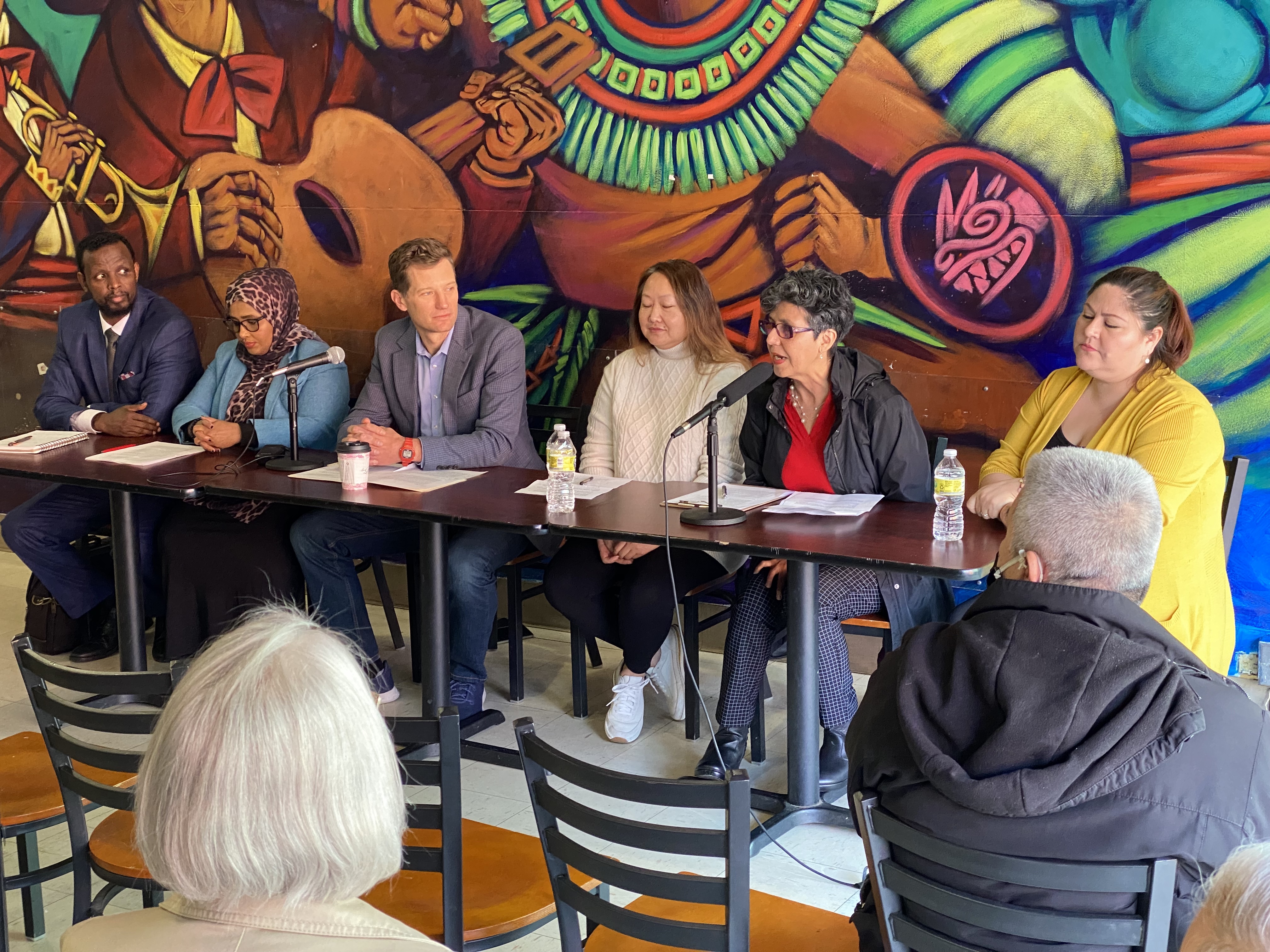6/21/2022 12:39:27 PM
Immigrant and Refugee Affairs Assistant Commissioner Anisa Hajimumin

Commissioner Grove and Assistant Commissioner Hajimumin at a Roundtable for New Americans in Minneapolis
Every year, people around the globe celebrate World Refugee Day on June 20. This day is designated to raise awareness about refugees – people like myself who have fled their homes because of civil war or natural disasters.
Being a refugee means you lost everything you had or that had been built for you. Imagine walking away with nothing from your life as you knew it, and your only priority is to save your loved ones and get them safely out of the conflict zone. Imagine striving to keep hope alive in the face of adversities that seem insurmountable.
Perseverance is a must and giving up is not an option – even when there is a lack of food and water, and no time to grieve or process what happened. The only way out is to look forward to the light at the end of the tunnel. Optimism means coming to a safe place, where there will hopefully be people to welcome you, embrace you and shelter you from the pain and suffering you have witnessed.
Learning to navigate a newfound home, resettling, and learning the culture, customs, and language is intense and exposes you to vulnerability – while you figure out how to re-create the life you had and pave the way for a better one for your children. It’s a process of opening emotionally and sharing your fears and thoughts with strangers because you have nothing to hide, nothing to lose and nowhere to turn.
This is just the tip of the iceberg of what refugees go through – not to mention the many other barriers to creating a better life. They face a system that hinders them, including a lack of support for gainful employment with their earned university degrees, plus discrimination based on language, ethnicity, race and religion. For many, because of system failures, their hope for creating a successful life in another country is greatly diminished, and the ensuing frustration is sometimes followed by depression and other mental health issues.
In Minnesota, we have many refugees that arrive with rich cultures, customs, and talents that would be beneficial to employers. The refugees have made their home here and continue to contribute to the economy and the diverse communities that make Minnesota a destination for newcomers. The latest arrivals are the 1500+ Afghans who have resettled since September 2021. The arrival of immigrants from Afghanistan brought together immigrant communities and community leaders. Local and state leadership have worked to unify their efforts in order to welcome and assist Afghan community members with ease. The State of Minnesota is now preparing to welcome Ukrainian refugees who will be supported to make their homes here, find employment, and re-establish their lives.
In addition to World Refugee Day, June is also Immigrant Heritage Month and Caribbean American Heritage Month. Nearly half a million immigrants (484,192 people) call Minnesota home. And as of 2018, 9% of Minnesotans were foreign-born and 18% of children in Minnesota are either a child of an immigrant or were themselves born in a different country. More so, 51% of Minnesota's foreign-born population are naturalized U.S. citizens.
The New American Economy helps demonstrate that immigrants and refugees are vital to the state's growth. These individuals successfully oversee more than 19,000 businesses, earning $17.5 billion in household income, generating $411.7 million in business income, and contributing over $4.8 billion in federal, state, and local taxes. Between 2010-2018, immigrants and refugees accounted for nearly 60% of Minnesota’s labor force. The state’s immigrants make up:
Additionally, there are over 159,000 college degrees held by foreign-born Minnesotans. One in three immigrants aged 25 or older has a college degree (35%), and one in three immigrants with a university degree has more than a bachelor’s degree (35%). Most immigrants with a college degree are employed (78%), and most immigrants with those credentials are employed full-time and year-round (75%).
It is important to note that this year, June 20, 2022, marks the 10-year anniversary of the Deferred Action for Childhood Arrivals (DACA) program. There are over 7,000 DACA-eligible residents in Minnesota contributing to the economy. DACA eligible residents earned $224.5 million and paid $52.2 million in federal and local taxes.
Many states look to Minnesota as the most progressive state when it comes to immigrant and refugee inclusion. Housed in the Department of Employment and Economic Development (DEED), the Office of Immigrant and Refugee Affairs has worked to remove barriers that immigrants and refugees in the state face, including economic and workforce development challenges.
Some of the community connectedness work the Office of Immigrant and Refugee Affairs has undertaken includes:
The Office’s educational work includes:
The Office of Immigrant and Refugee Affairs sought to be codified through legislation during the 2022 legislative session but was not successful. The Office continues to serve immigrants, refugees, and new Americans, working to include our newcomers who make Minnesota their home and becoming important contributing members of the community.
immigrants and refugees